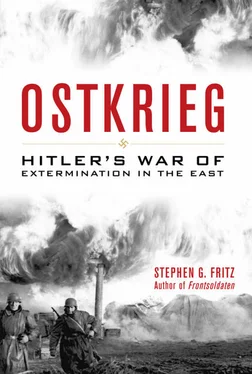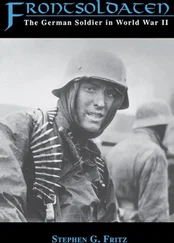But what could be done, especially since Hitler had declared the prerequisites for Operation Sea Lion, the invasion of Great Britain, to be absolute command of the air and sea, both of which had to be achieved by the beginning of September? Since this appeared doubtful at best, how was Britain to be subdued? Frankly, Hitler had no good answer. He pondered forming “a solid political front, Spain, Italy, Russia,” against it, then seemed to put his hopes once again on the Luftwaffe and the navy: “air assaults and submarine warfare… smash enemy fighter strength… combined with intensified submarine warfare.” He also speculated on promoting opposition to Churchill by encouraging an English peace party thought to be forming around David Lloyd George and the Duke of Windsor. Only lastly was mention made of the possibility of “tackling the Russian problem” in the autumn, as Brauchitsch outlined for Hitler the hastily conceived army plan:
Object: To crush Russian army or at least take as much Russian territory as is necessary to bar enemy air raids on Berlin and Silesian industries….
Political aims: Ukrainian state; federation of Baltic states; White Russia….
Strength required: Eighty to one hundred divisions. Russia has fifty to seventy-five good divisions. If we attack Russia this fall, pressure of air war on Britain will be relieved. United States could supply both Britain and Russia.
Operations: What operational objective could be attained…?
Protect Berlin and Silesian industrial area. Protection of Rumanian oil fields.
Clearly, the main theme at this conference was how to proceed against Great Britain, with discussion only belatedly turning to military action against Russia. Significantly, however, the earlier notion of a spoiling action seemed to have expanded; even if what was presented to Hitler was not the blueprint for a war of extermination, it was hardly a “limited war,” given territorial aims reminiscent of those obtained by the Treaty of Brest-Litovsk that would both secure vital raw materials for the Reich and force Russia to acknowledge German hegemony. 15
At this 21 July conference, then, the alternatives available at the moment—the invasion of Britain or an attack on the Soviet Union—were both raised and discussed. Hitler, however, doubted that either operation could succeed. He pointed out the great risk of failure of a cross-Channel assault, noting that it was “not just a river crossing, but the crossing of a sea dominated by the enemy,” and responded to the proposal of an autumn attack on Russia with skeptical questions. Shortly after the conference, in fact, Jodl and Keitel had to admit that time, space, and weather factors rendered an autumn attack “totally impracticable.” Ironically, Halder, too, had succumbed to doubts. The latest estimates of Soviet strength proved far higher than expected, while Italian difficulties in North Africa signaled a possible drain on German resources. As a result, Halder now put greater emphasis on knocking Britain out of the war before plunging ahead in the east. Indeed, on 30 July, he and Brauchitsch agreed that it would be better to remain “on terms of friendship with Russia” and concentrate instead on attacking British positions in the Mediterranean and the Middle East. 16
In reality, Hitler faced an impasse, unable to end the war against England, and fretting as the military-political initiative slipped away. Moreover, considerations of possible Russian and American actions, and the threat they posed to Germany, increasingly preoccupied the Führer: Great Britain had to be gotten out of the war in order to prevent the United States and Russia from entering. The intensifying American support for England, and its surging military potential, introduced a crucial time factor into Hitler’s calculations: if he was to realize his goal of Lebensraum in the east, he needed to do so quickly. In mid-May, even as German panzers raced to the sea, President Roosevelt had put before Congress a proposal, swiftly approved, for an enormous expansion of American military power; the result would be that by 1941 the United States, while still neutral, produced virtually as much war materiel as either Great Britain or Germany. Nor were the Germans unaware against whom this military might was ultimately to be directed. From the summer of 1940, Goebbels stepped up anti-American propaganda, with a sharp focus on the alleged Jewish dominance in Washington and the determination of the Jewish conspiracy to exterminate the German nation. Significantly, on the same day that Hitler delivered his peace offer, Roosevelt was nominated for a third term at the Democratic Party’s convention in Chicago. This was “a blow to Hitler,” William Shirer noted, “which the Wilhelmstrasse scarcely hid…. Hitler fears Roosevelt. He is just beginning to comprehend that Roosevelt’s support of Great Britain is one of the prime reasons why the British decline to accept his kind of peace…. [To the Germans] Roosevelt is the father of English illusions about the war.” 17
To Hitler, however, it was no illusion; Britain would go on as long as Roosevelt provided it with massive material aid. Measures such as the destroyers-for-bases deal in September 1940, which seemed to confirm the creation of an Anglo-American coalition, and Lend-Lease in March 1941, which the German leadership regarded as a virtual declaration of war, simply confirmed Hitler in his determination to solve his strategic problem before American power irretrievably tipped the scales against Germany. 18Hitler now faced a decision. The United States would not be ready for active military intervention until 1942; Germany thus had a brief window of opportunity that had to be seized if it was to secure the resources necessary for the looming confrontation with America. In 1940, Germany stood at the height of its military strength vis-à-vis its enemies and for the near term possessed virtual freedom from the reality of a two-front war, so, if Hitler meant to realize his goal of Lebensraum in the east, the time for action was at hand.
Economic pressures also contributed to Hitler’s sense of urgency, in addition to reinforcing his notions of the absolute necessity of securing living space in Eastern Europe. The situation in the summer of 1940, in fact, resembled that of 1914–1918, when Germany was defeated because of deficiencies in raw materials and foodstuffs. Starvation as yet was not a problem, but, by the fall of 1940, grain stockpiles would be exhausted. Although Germany had derived short-term economic advantages from the alliance with the Soviet Union, the occupation of Western Europe and the threat of a drawn-out war meant that Russia’s willingness to supply food and raw materials was crucial. Increasingly, too, the Germans expected that Moscow would exact a high price for such deliveries, certainly highly valued industrial and military goods, perhaps even hegemony in Eastern and Southeastern Europe. For his part, Stalin, in line with his notion that a protracted war of attrition between the capitalist powers would benefit the Soviet Union, had always intended to derive the greater advantage from the economic relationship with Germany, both to promote Soviet expansive aims and to force the Germans to provide vital goods and technology. The Germans got a first glimpse of Stalin’s willingness to use his new leverage six weeks before the start of the offensive in the west, when the Soviet Union temporarily suspended vital oil and grain deliveries. Although the situation had been quickly resolved, Germany now found itself in a far greater measure of economic dependence on the Soviet Union than anticipated, a dependence that was likely to increase the longer the war continued. 19
German reliance on Soviet grain supplies, which could only rekindle anxious memories of the hunger blockade of 1914–1918, proved especially stressful. Hitler’s economic experts also made him aware that, in any protracted war against Great Britain and the United States, which seemed increasingly likely, Germany would need vastly greater deliveries of food and raw materials from the Soviet Union, a prospect that seemed to invite an inexorably deeper dependence. This Hitler simply could not tolerate. The Führer agreed with his economics minister, Walter Funk, that the “greater German economic sphere [ Großraumwirtschaft ]” could not “become dependent on forces or powers over which we have no influence.” Equally troublesome was the German inability to force Russia into the role originally assigned it, that of a supply source for the Reich economy. Both the massive buildup of Soviet armaments and the autarkic direction of the Russian economy represented a long-term threat to Germany. By the summer of 1940, in fact, it had become doubtful whether, given the increasing consumption of raw materials and foodstuffs within the Soviet Union, Stalin could or would make large quantities available to Germany. Ironically, besieged Great Britain had largely secured the economic resources it needed to continue the war; for Hitler, the question remained to be answered. 20
Читать дальше












